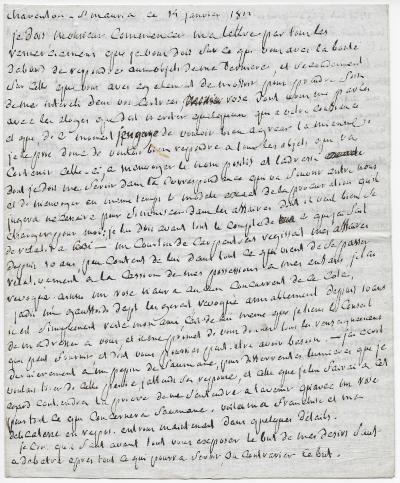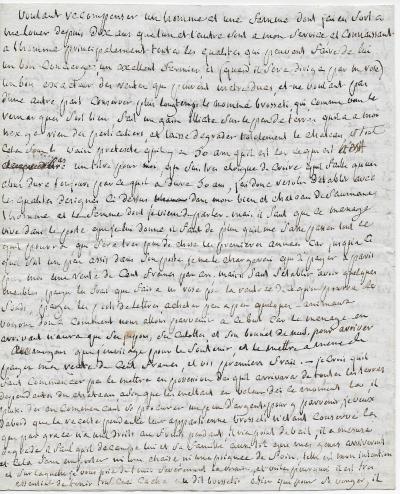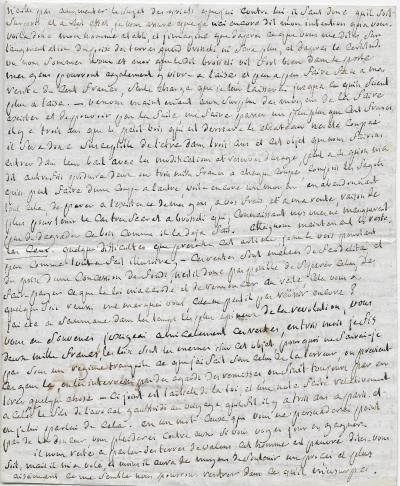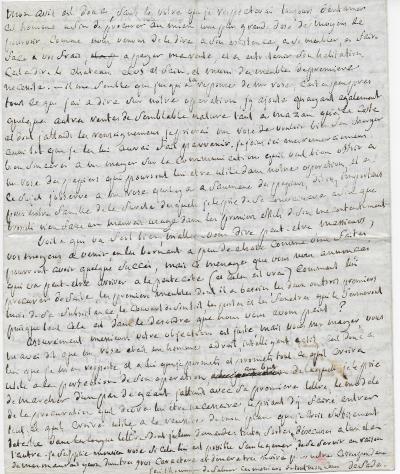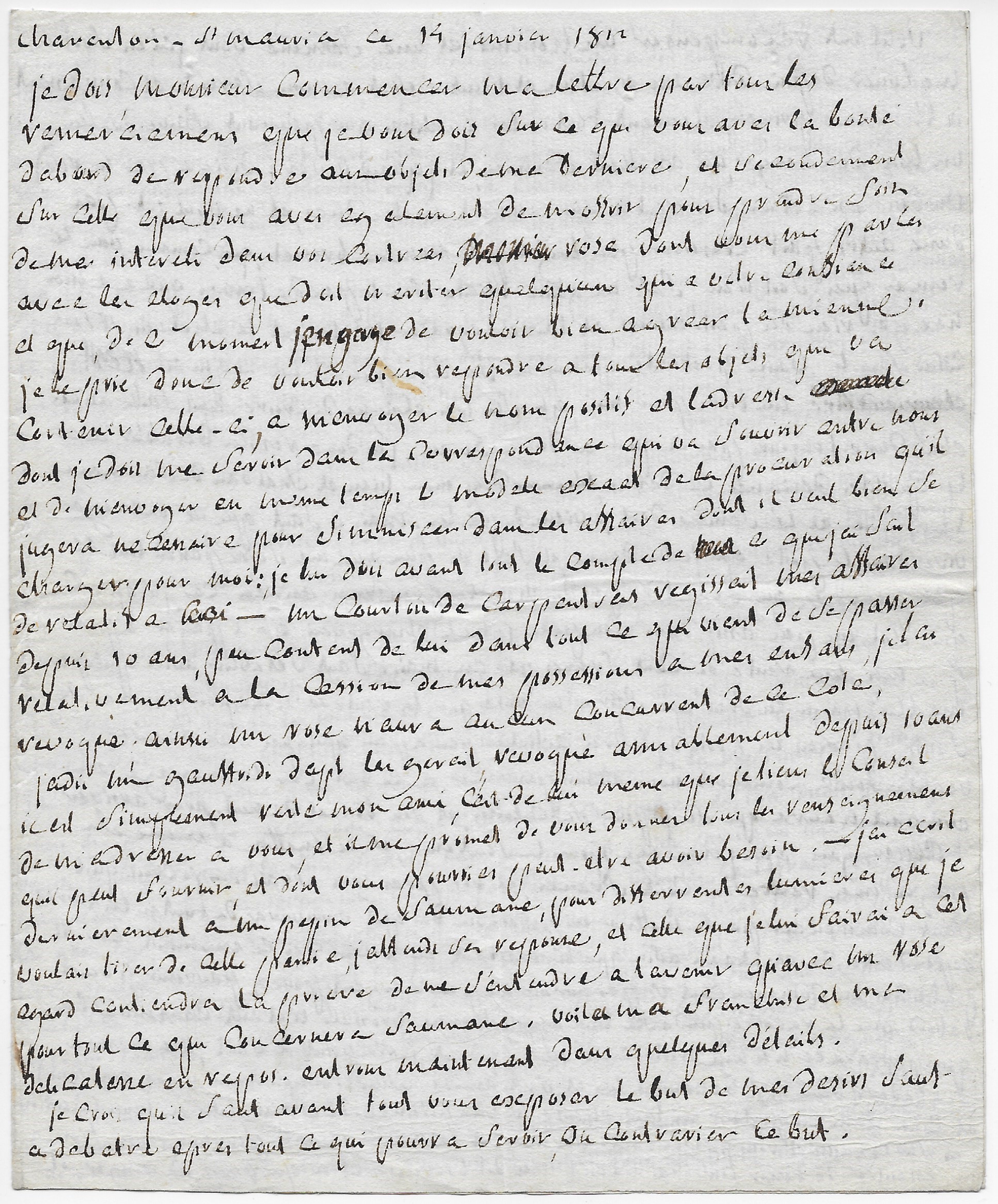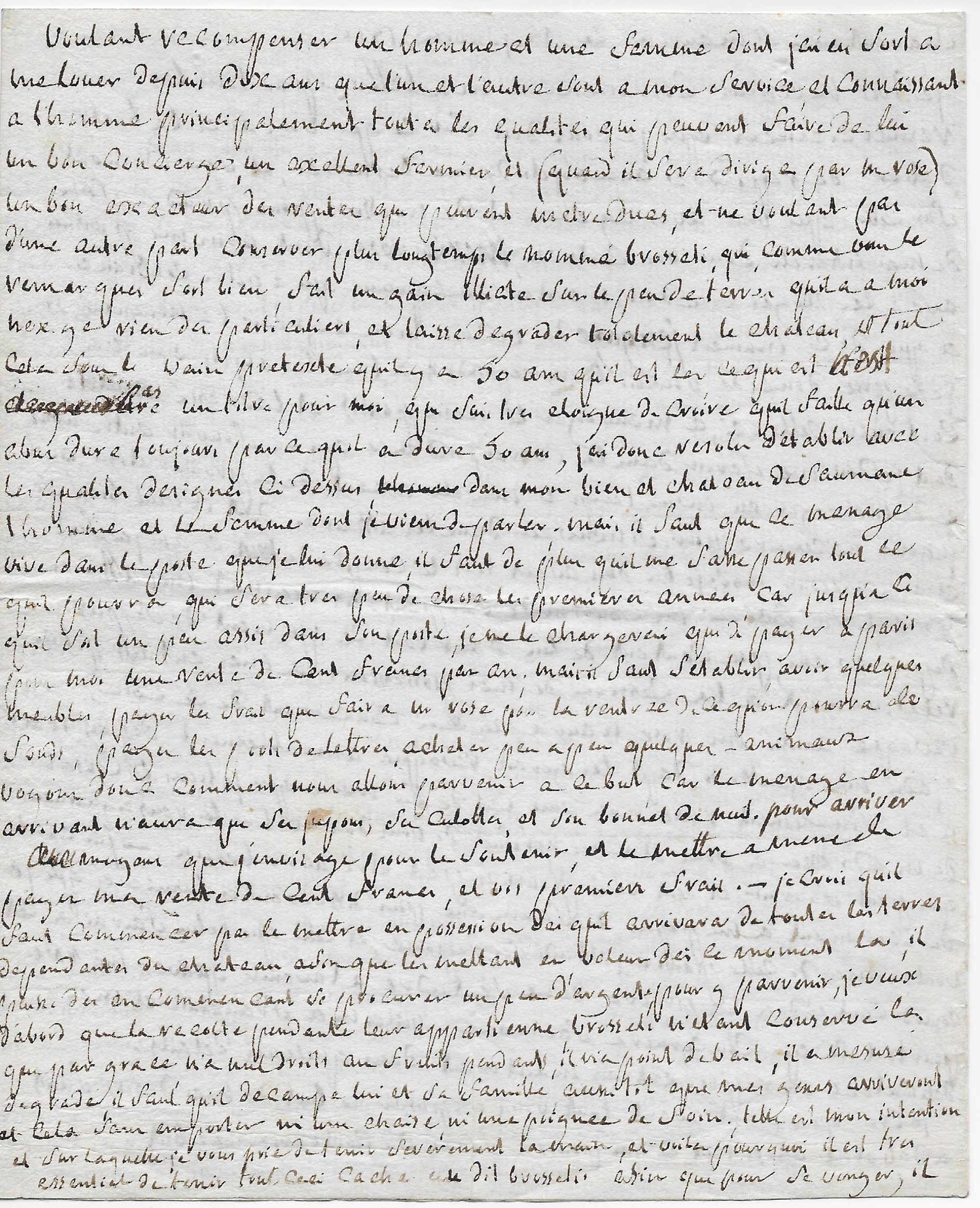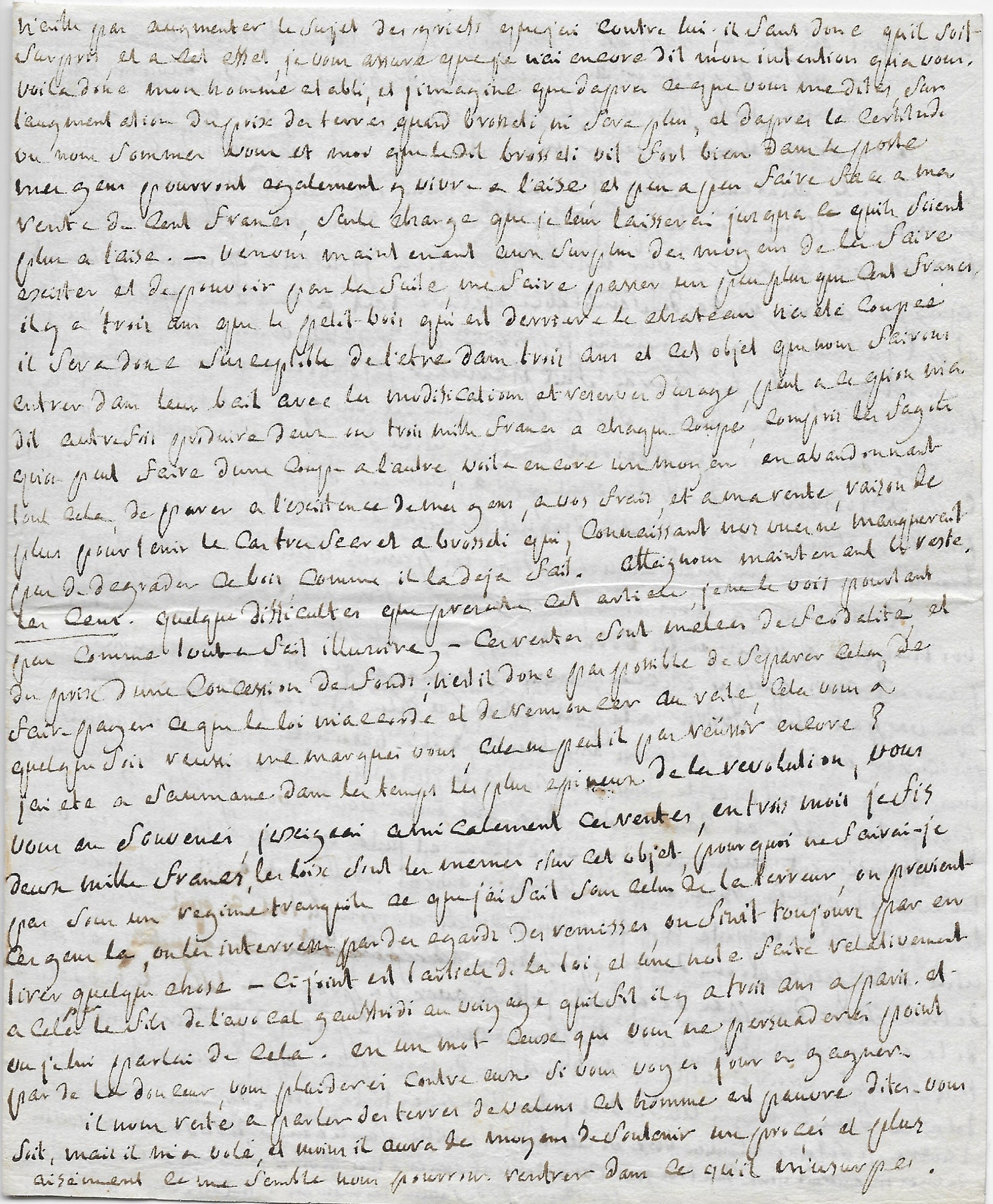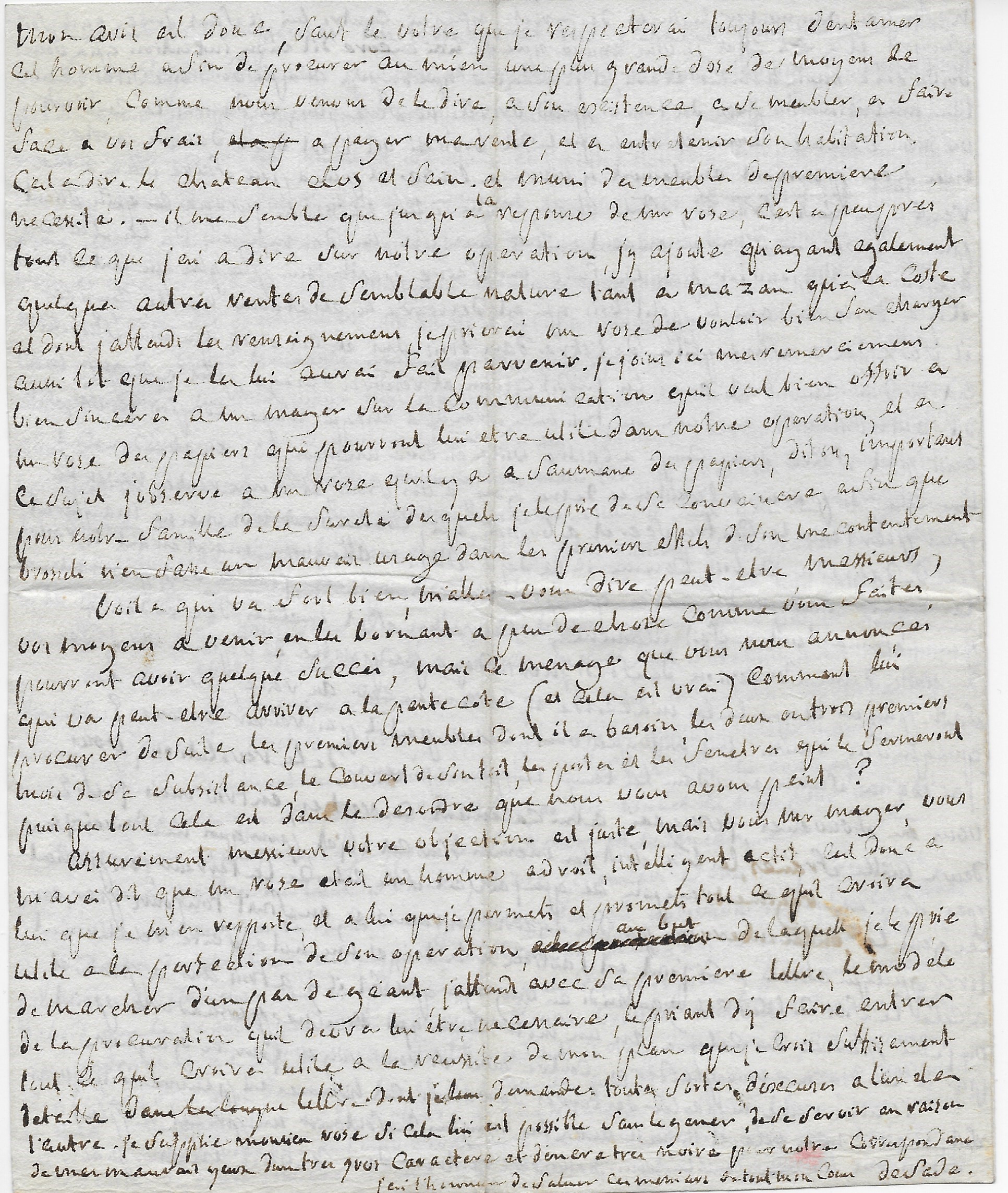The Marquis de SADE – Autographed letter signed
Donatien-Alphonse-François marquis SADE (1740 - 1814), French novelist and philosopher
Autograph letter signed to his council. Charenton-Saint-Maurice, January 14, 1812; 4 pages in-4°.
Letter from the last years. The Marquis de Sade, deprived of his freedom, ill, nevertheless vigilantly manages the exploitation of his lands and his castles: "I must Sir begin my letter with all the thanks that I owe you for what you have the kindness first of all to respond to the objects (...) to take care of my interests in your regions. Mr. Rose of whom you speak with the praise that should not be avoided by someone who has your conscience and who, from this moment engaged to be willing to accept mine. I therefore ask him to be willing to respond to you on all the objects that this one will contain, to send me the name and address that I must use in the correspondence that will open between us and to send me at the same time the exact model of the power of attorney that he will judge necessary to interfere in the affairs that he wants to take care of for me (...). Mr. Courtois, from Carpentras, has been managing my affairs for 10 years, not happy with him in all that has just happened regarding the transfer of my possessions to my children, I have dismissed him. Thus Mr. Rose will have no competition on this side. Formerly Mr. Gaufridy from Apt [his lawyer], amicably dismissed for 10 years, he has simply remained my friend. It is from him that I have the advice to address myself to you, and he promises me to give you all the information that can provide, and that you might perhaps need. I recently wrote to a paper of Saumane, for various lights that I wanted to draw from this part. I await answers, and the one that I will give him in this regard will contain the request to come to an agreement in the future only with Mr. Rose for everything that concerns Saumane. There is my frankness and my tact at rest. Let us now go into some details. I believe that I must first of all explain to you the purpose of my desires without debating after all that could have to do with or thwart this purpose. Wanting to reward a man and a woman of whom I have had much to praise for the ten years that both have been in my service, and knowing in the man mainly all the qualities that can make him a good concierge, an excellent farmer, and (when he will be managed by Mr. Rose) a good exactor of the rents that may be due, and not wanting on the other hand to keep any longer the man named Brosseli, who, as you note, has indeed made an illicit gain on the little land that he has of mine, this under the vain pretext that he has been there for 50 years, which is not a title for me (…) I have therefore resolved to establish with the qualities designated above in my castle of Saumane the man and the woman of whom I have just spoken. But this household must live in the position I give it, it must also send me everything it can, which will be very little in the first years because until it is somewhat established in its position, I will only charge it with paying for me in Paris an annuity of one hundred francs per year; but it is necessary to settle down, have some furniture, (…) buy little by little some animals. Let us see then how we are going to achieve this goal, because the household on arriving will have only its petticoats, its breeches, and its nightcap to arrive. I plan to support it, to enable it to pay my annuity of one hundred francs, and your first expenses. I believe that we must begin by putting him in possession as soon as he arrives of all the lands dependent on the castle before they are developed at that moment, he can get a little money from the beginning, to achieve this, I want first of all that the pending harvest belongs to him, Brosseli being kept there only by grace has no rights to the pending fruits, he has no lease, he has degraded, he must decamp him and his family as soon as my people arrive and that without taking neither a chair, nor a handful of hay. Such is my intention and on which, I beg you to hold your hand strictly, and here for me it is very essential to keep all this hidden or said Brosseli so that to take revenge, he does not increase the subject of the grievances that I have against him, it is therefore necessary that he be surprised, and to this effect, I assure you that I have not yet said my intention except to you. So here is my man established, and I imagine that according to what you tell me without the increase in the price of land when Brosseli, will be no more, and according to the certainty that we are you and I that the said Brosseli lives well in the post my people will also be able to live there comfortably and little by little face my sale of one hundred francs, the only charge that I will leave them until they are more comfortable. Let us now come to the surplus of the means of making it exist and of being able subsequently, to make me pass a little more than one hundred francs, it is three years since the small wood which is behind the castle was cut. It will therefore be likely to be in three years and these objects that we are bringing into their lease with the modification and reservations of use (…) I was told in the past that I produce two or three thousand francs at each cut, including the bundles (…) here is yet another way by abandoning all that to provide for the existence of my people, at your expense, and for my income, all the more reason to hold (…) Brosseli who knowing our views would not fail to degrade this wood as he has already done. Let us now reach the rest of the hundred. Some difficulties that appear I do not however see as completely illusory, These incomes are mixed with feudalism, and the price of a concession of land, is it not therefore possible to separate that from making pay what the law has ceded to me and to renounce the rest? (…) can this not still succeed? I was at Saumane [the castle of Saumane] in the most thorny times of the revolution, you will remember, I amicably demanded these sales, in three months I made two thousand francs, the laws are the same on this subject, why should I not do under a peaceful regime what I did under that of terror (…) Attached is the article of the law, and a note made relative to this by the son of the lawyer Gaufridi on the trip he made three years ago to Paris and where I spoke to him about this. In a word, those whom you will not persuade with kindness, you will plead against them if you see nothing to gain. It remains for us to speak of valuable lands. This man is poor, you say. Fine, but he has robbed me, and the less means he has to support a lawsuit, the more easily it seems to me we will be able to get back into what he usurps from me. My opinion is therefore (…) to provide mine with a greater dose of means to be able as we have just said (…) to meet your expenses, to pay for my sale, and to maintain his dwelling, that is to say the castle enclosed and sound and provided with the furniture of first necessity (…) that is about all I have to say about our operation, I add that having also some other sales of a similar nature both in Mazan and in La Coste and of which I await the information, I will ask Mr. Rose to be kind enough to take charge of it as soon as I have sent it to him (…) That will go very well to tell you, gentlemen, perhaps your future means by limiting them to a few things as you do could have some success, but this household that you announce to us which will perhaps arrive at Pencote how to provide him immediately, the first furniture he needs, the first two or three months of subsistence (…) since all that is in the disorder that we have described to you? Certainly, sir, your objection is fair, but (…) you told me that Mr. Rose was a skillful, intelligent, active man, so it is to him that I refer it (…) I await with his first letter, the model of the power of attorney that he will need, asking him to include in it everything he believes useful for the success of my plan that I believe is sufficiently detailed in the long letter (…)”
The Marquis de Sade spent the last years of his life interned in the asylum of Charenton by decision of the First Consul Napoleon Bonaparte who, having read Justine, declared: "The most abominable book that the most depraved imagination has ever given birth to" (The Memorial of Saint Helena). The moral authorities feared that his writings would pervert the population. At Charenton, Sade was continually observed, controlled in his literary production, even if for a time he succeeded, under the good auspices of the director of Charenton, M. de Coulmiers, in organizing theatrical performances with therapeutic virtues according to the latter. But censorship under the empire put an end to this entertainment deemed inappropriate. His detention subsequently became more severe with the ban on touching ink and paper. Obese and ill, the Marquis de Sade died on December 2, 1814, ironically, at the same time his persecutor, the fallen emperor, endured his first exile on the island of Elba.
Autograph letter signed to his council. Charenton-Saint-Maurice, January 14, 1812; 4 pages in-4°.
Letter from the last years. The Marquis de Sade, deprived of his freedom, ill, nevertheless vigilantly manages the exploitation of his lands and his castles: "I must Sir begin my letter with all the thanks that I owe you for what you have the kindness first of all to respond to the objects (...) to take care of my interests in your regions. Mr. Rose of whom you speak with the praise that should not be avoided by someone who has your conscience and who, from this moment engaged to be willing to accept mine. I therefore ask him to be willing to respond to you on all the objects that this one will contain, to send me the name and address that I must use in the correspondence that will open between us and to send me at the same time the exact model of the power of attorney that he will judge necessary to interfere in the affairs that he wants to take care of for me (...). Mr. Courtois, from Carpentras, has been managing my affairs for 10 years, not happy with him in all that has just happened regarding the transfer of my possessions to my children, I have dismissed him. Thus Mr. Rose will have no competition on this side. Formerly Mr. Gaufridy from Apt [his lawyer], amicably dismissed for 10 years, he has simply remained my friend. It is from him that I have the advice to address myself to you, and he promises me to give you all the information that can provide, and that you might perhaps need. I recently wrote to a paper of Saumane, for various lights that I wanted to draw from this part. I await answers, and the one that I will give him in this regard will contain the request to come to an agreement in the future only with Mr. Rose for everything that concerns Saumane. There is my frankness and my tact at rest. Let us now go into some details. I believe that I must first of all explain to you the purpose of my desires without debating after all that could have to do with or thwart this purpose. Wanting to reward a man and a woman of whom I have had much to praise for the ten years that both have been in my service, and knowing in the man mainly all the qualities that can make him a good concierge, an excellent farmer, and (when he will be managed by Mr. Rose) a good exactor of the rents that may be due, and not wanting on the other hand to keep any longer the man named Brosseli, who, as you note, has indeed made an illicit gain on the little land that he has of mine, this under the vain pretext that he has been there for 50 years, which is not a title for me (…) I have therefore resolved to establish with the qualities designated above in my castle of Saumane the man and the woman of whom I have just spoken. But this household must live in the position I give it, it must also send me everything it can, which will be very little in the first years because until it is somewhat established in its position, I will only charge it with paying for me in Paris an annuity of one hundred francs per year; but it is necessary to settle down, have some furniture, (…) buy little by little some animals. Let us see then how we are going to achieve this goal, because the household on arriving will have only its petticoats, its breeches, and its nightcap to arrive. I plan to support it, to enable it to pay my annuity of one hundred francs, and your first expenses. I believe that we must begin by putting him in possession as soon as he arrives of all the lands dependent on the castle before they are developed at that moment, he can get a little money from the beginning, to achieve this, I want first of all that the pending harvest belongs to him, Brosseli being kept there only by grace has no rights to the pending fruits, he has no lease, he has degraded, he must decamp him and his family as soon as my people arrive and that without taking neither a chair, nor a handful of hay. Such is my intention and on which, I beg you to hold your hand strictly, and here for me it is very essential to keep all this hidden or said Brosseli so that to take revenge, he does not increase the subject of the grievances that I have against him, it is therefore necessary that he be surprised, and to this effect, I assure you that I have not yet said my intention except to you. So here is my man established, and I imagine that according to what you tell me without the increase in the price of land when Brosseli, will be no more, and according to the certainty that we are you and I that the said Brosseli lives well in the post my people will also be able to live there comfortably and little by little face my sale of one hundred francs, the only charge that I will leave them until they are more comfortable. Let us now come to the surplus of the means of making it exist and of being able subsequently, to make me pass a little more than one hundred francs, it is three years since the small wood which is behind the castle was cut. It will therefore be likely to be in three years and these objects that we are bringing into their lease with the modification and reservations of use (…) I was told in the past that I produce two or three thousand francs at each cut, including the bundles (…) here is yet another way by abandoning all that to provide for the existence of my people, at your expense, and for my income, all the more reason to hold (…) Brosseli who knowing our views would not fail to degrade this wood as he has already done. Let us now reach the rest of the hundred. Some difficulties that appear I do not however see as completely illusory, These incomes are mixed with feudalism, and the price of a concession of land, is it not therefore possible to separate that from making pay what the law has ceded to me and to renounce the rest? (…) can this not still succeed? I was at Saumane [the castle of Saumane] in the most thorny times of the revolution, you will remember, I amicably demanded these sales, in three months I made two thousand francs, the laws are the same on this subject, why should I not do under a peaceful regime what I did under that of terror (…) Attached is the article of the law, and a note made relative to this by the son of the lawyer Gaufridi on the trip he made three years ago to Paris and where I spoke to him about this. In a word, those whom you will not persuade with kindness, you will plead against them if you see nothing to gain. It remains for us to speak of valuable lands. This man is poor, you say. Fine, but he has robbed me, and the less means he has to support a lawsuit, the more easily it seems to me we will be able to get back into what he usurps from me. My opinion is therefore (…) to provide mine with a greater dose of means to be able as we have just said (…) to meet your expenses, to pay for my sale, and to maintain his dwelling, that is to say the castle enclosed and sound and provided with the furniture of first necessity (…) that is about all I have to say about our operation, I add that having also some other sales of a similar nature both in Mazan and in La Coste and of which I await the information, I will ask Mr. Rose to be kind enough to take charge of it as soon as I have sent it to him (…) That will go very well to tell you, gentlemen, perhaps your future means by limiting them to a few things as you do could have some success, but this household that you announce to us which will perhaps arrive at Pencote how to provide him immediately, the first furniture he needs, the first two or three months of subsistence (…) since all that is in the disorder that we have described to you? Certainly, sir, your objection is fair, but (…) you told me that Mr. Rose was a skillful, intelligent, active man, so it is to him that I refer it (…) I await with his first letter, the model of the power of attorney that he will need, asking him to include in it everything he believes useful for the success of my plan that I believe is sufficiently detailed in the long letter (…)”
The Marquis de Sade spent the last years of his life interned in the asylum of Charenton by decision of the First Consul Napoleon Bonaparte who, having read Justine, declared: "The most abominable book that the most depraved imagination has ever given birth to" (The Memorial of Saint Helena). The moral authorities feared that his writings would pervert the population. At Charenton, Sade was continually observed, controlled in his literary production, even if for a time he succeeded, under the good auspices of the director of Charenton, M. de Coulmiers, in organizing theatrical performances with therapeutic virtues according to the latter. But censorship under the empire put an end to this entertainment deemed inappropriate. His detention subsequently became more severe with the ban on touching ink and paper. Obese and ill, the Marquis de Sade died on December 2, 1814, ironically, at the same time his persecutor, the fallen emperor, endured his first exile on the island of Elba.
This description has been translated automatically. please click here Click here to display the original language FR
End of sale
This item is not available. Please click on « View the catalog » to see similar items available.
Delivery France:
30.00 € incl. VAT (*)
Country prices, click on See
See more
Hotline
Please contact us for any question regarding this object. For any other inquiry, we invite you to fill the contact form.
Other items from the category « Books »
